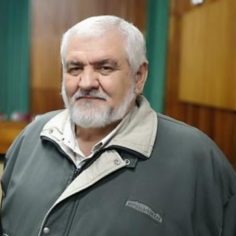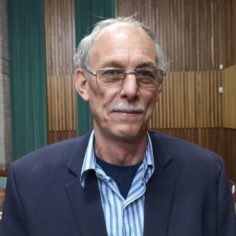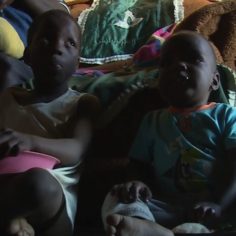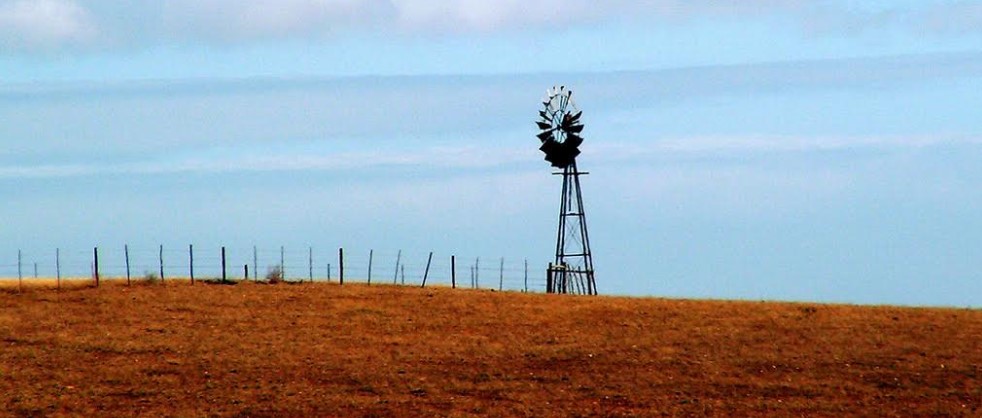Countdown to land grab: South African farmers under siege
The country's radical left-wing and anti-white government is intent on confiscating land beloning to white farmers — without compensation. The process of state-sanctioned land grab was given further momentum when another parliamentary motion was passed on Thursday.
Published: July 27, 2019, 5:47 pm
This week saw another vote in the ANC-dominated parliament in favour of changing the South African constitution to allow for expropriation of property without compensation. On Thursday a motion to establish an ad hoc committee to draft an amendment of Section 25 of the Constitution, protecting property rights, was passed with 189 votes to 67, without any abstentions.
A broad coalition of anti-white parties, including the ANC, EFF and NFP voted for the motion, while those in opposition such as the DA, IFP, FF Plus and ACDP voted against.
The ANC’s chief whip, Pemmy Majodina, introduced the motion which stated that the fifth paliament had already adopted a report by the constitutional review committee (CRC) recommending the Constitution should be amended so section 25 “makes explicit that which is implicit in the Constitution, with regards to expropriation of land without compensation, as a legitimate option for land reform, so as to address the historic wrongs caused by the arbitrary dispossession of land, and in so doing ensure equitable access to land and further empower the majority of South Africans to be productive participants in ownership, food security and agricultural reform programmes”.
Agricultural reform or “land reform” in South Africa is a euphemism for expropriating farms belonging to whites.
Prior to voting on the motion, MPs from the ANC and EFF, the latter clad in their customary red uniforms, stood up and sang some anti-white songs in the house of parliament.
“We must complete this. We are hungry, we want our land back,” Majodina said after tabling the motion, to applause from the ANC and EFF.
His counterpart from the opposition DA, chief whip John Steenhuisen said it was a “smokescreen for the government’s failure with land reform over the past two decades”. He added the process to change the constitution was “legally, procedurally and constitutionally flawed”.
“What this motion is, it is the greatest hoax perpetrated on the people of South Africa,” Steenhuisen added.
IFP MP Elphas Buthelezi saw no justification for amending the Constitution.
“The Constitution has not failed our people, it is the policies of this (ANC) government that failed our people,” he said.
Pieter Groenewald, the leader of the Afrikaner party Freedom Front Plus, said that the motion should have been named “the “motion to destroy the economy and the future of South Africa”. He also felt that the radical Marxist party, the EFF, was more honest than the ANC with its pretense of “setting preconditions” to land grabbing.
“The EFF is more honest than the ANC. For them, it is an ideological issue because they say they want the land,” Groenewald said.

Bennie van Zyl, general manager of TLU SA, highlighted the corruption in the Land Affairs Department. Photo: FWM
Bennie van Zyl, general manager of TAU SA, told Farmer’s Weekly that he worried about the fact that the land affairs department was mired in corruption.
Both major farmers’ unions in South Africa responded negatively to the motion. A spokeswoman for the liberal farmers’ union, Agri SA, expressed her disappointment as she had always believed that the ANC regime could expropriate without actually changing the current constitution. Agri SA is in favour of so-called “land reform” and has even offered to cooperate with the ANC. “Whether land reform will be speeded up, must be seriously questioned,” said Annalize Crosby, spokeswoman for Agri SA. “The failure of land reform has a lot to do with the bad implementation of policy and laws and inadequate budgets and little with the unwillingness of sellers (of land).”
The more conservative union, TLU SA, described the passing of the motion as “short-sighted” and “hugely irresponsible”.
“Expropriation without compensation will not deliver any good results,” said Mr Louis Meintjes, the president of TLU SA. “Research shows most of the applicants do not have the knowledge or capacity to sustainably manage the land, which at the moment contributes significantly to the rural and national economy. In most cases, they would instead opt to be financially compensated than to be in charge of the land.
“The past has shown us most of the land previously expropriated now lies barren because the government did not care enough to support the new owners to manage the land successfully.”
TLU SA believes that the current steps to confiscate white-owned land have a direct effect on farmers, their workers and the rural parts of the country, but also on the confidence foreign investors have in the future of the country.

Land expropraition without compensation is “one of the biggest threats there is” says President of TLU SA, Louis Meintjies. Photo: FWM
“When an investor’s private ownership is implicated, it will naturally not be wise for them to invest their assets there,” said Mr Meintjies.
Asked by FWM whether South African farmers perceived expropriation of land without compensation as a threat, Mr. Meintjies replied:
“I think it is probably one of the biggest threats there is. It creates policy uncertainty and projects that we have started (have now been jeopardised) as people have told us that as a result of expropriation without compensation, they will not invest. We have a very big pig-farming project that would add many millions in value to South Africa but which has now been stopped, and so we can go on. Of course, it creates uncertainty. People will not invest.”
However, farmers could not stop farming without going out of business immediately. According to Meintjies, “We are here. If I had to say that I should stop farming… On my farm there is a (politically-motivated) land claim. I am going on with my life. Then you have to take it as it comes. But you also have to make a plan… We have to oppose it together. But to stop now and say that I cannot farm any further, is not going to help me. On the contrary, I am going to be wiped out. In six months’ or a year’s time, if I had to stop farming, I would not exist anymore, then I would be a homeless man in the streets.”
South Africa has no social safety net and therefore expropriated farmers would become indigent or even homeless as they live on their farms, not to mention their workers and employees who would not only lose their livelihood but also in many cases their living quarters on the same farms.

Zimbabwe is moving from a crisis to an emergency because of the ongoing economic meltdown, the United Nations said. People are in desperate need of food aid thanks to the land grab policies of former leader Robert Mugabe. Screenshot from VOA News
After twenty years, Zimbabwe is still struggling to overcome the disastrous effects of its own land grab against white farmers, initiated by ex-president Robert Mugabe, with hyperinflation, as well as food and currency shortages still plaguing the country.
In its “Food Assistance Factsheet”, dated 20 May 2019, USAID stated:
“Economic instability, poor rainfall, crop pests, and livestock and crop diseases undermine food security in Zimbabwe. More than 90 percent of rural households in the country depend on agriculture as their primary livelihood… The Famine Early Warning Systems Network (FEWS NET) projects that Crisis (IPC 3) levels of acute food insecurity will persist in areas where crop production is not sufficient to meet the population’s food needs from June–September. Most other areas of the country will likely face Stressed (IPC 2) conditions, as FEWS NET estimates the limited harvest will meet households’ minimal food needs and reduce their dependence on market-purchased food for three to four months.”
USAID, as well as other charities and NGOs, supply Zimbabwe with food aid.
Is South Africa therefore doomed to repeat the Zimbabwean catastrophe when it comes to food production? At least one Western parliament, that of the Netherlands, has recently expressed its opposition to racially-based land expropriation in South Africa, as reported on Free West Media.
Asked to respond to the Dutch parliamentary motion, Mr. Louis Meintjies of TLU SA told FWM: “I think it’s one of the most positive things that could happen to South Africa. Over the last three, four years we have been involved at the UN, at the EU parliament. There have been people who have come to visit us, political parties from various countries that have come to visit us, including the Dutch, the Americans, the Australians. So we have been involved there. But a large group of people have made a big difference in getting the Netherlands to the point where it took this decision.”
Meintjies continued that the challenge was now to see whether a similar resolution against expropriation without compensation could not be taken by all the parliaments in Europe, including the EU parliament. “The next challenge we are working on is to achieve the same for farm murders and farm attacks, that we get the same resolution regarding those issues,” Meintjies said. “In the Dutch parliament, in December, this motion is going to be presented, and the challenge is to get it through there as well.”
The president of TLU SA was of the opinion that recent election results in the European countries would make it easier to have such resolutions passed condemning expropriation and attacks on South African farmers.
All rights reserved. You have permission to quote freely from the articles provided that the source (www.freewestmedia.com) is given. Photos may not be used without our consent.
Consider donating to support our work
Help us to produce more articles like this. FreeWestMedia is depending on donations from our readers to keep going. With your help, we expose the mainstream fake news agenda.
Keep your language polite. Readers from many different countries visit and contribute to Free West Media and we must therefore obey the rules in, for example, Germany. Illegal content will be deleted.
If you have been approved to post comments without preview from FWM, you are responsible for violations of any law. This means that FWM may be forced to cooperate with authorities in a possible crime investigation.
If your comments are subject to preview by FWM, please be patient. We continually review comments but depending on the time of day it can take up to several hours before your comment is reviewed.
We reserve the right to delete comments that are offensive, contain slander or foul language, or are irrelevant to the discussion.

South Africa’s infrastructure 30 years after the end of Apartheid
LondonHating South Africa was part of growing up in North London in the 1980s. Pelle Taylor and Patrick Remington from Two Raven Films, recently interviewed South Africans about the decline of the country after Apartheid ended.

Nigerian President: More weapons for Ukraine end up in Africa
LagosSome time ago, FWM reported on arms deliveries to Ukraine, which shortly afterwards were resold on the Internet. Nigerian President Muhammadu Buhari has warned that "weapons used in the war in Ukraine are gradually leaking into the region" and called for strengthened border security.

Namibia sees opportunity to attract German energy refugees
Windhoek"The former German colony, Namibia wants to help Germany in its energy crisis". This is how an article in the online edition of a German newspaper recently began about Namibia's new "Digital Nomad" visa. The six-month visa is ideal for long-term holidaymakers. And for professionals who have their office on their laptop and can work from anywhere.

Uneven global population growth reaches 8 billion
According to the United Nations Population Fund (UNFPA), we celebrated the 8 billionth day* on November 15. The planet's population is still increasing dramatically, albeit at a decreasing pace.

French fuel debacle spills over to Senegal
DakarThe recent events at the French embassy in Burkina Faso were yet another demonstration against France on the African continent after France was ousted from Mali. All it took was a rumour to attract the sympathy of the population and demonstrators to head to the French Embassy.

New South African drone to compete with Turkey’s Bayraktar
PretoriaThe South African defense company Milkor unveiled its Milkor 380 reconnaissance and attack unmanned aerial vehicle (UAV). It is expected to become a competitor to Turkey's Bayraktar and Anka drones.

Bucking the trend: Uganda bans work by LGBT group
KampalaThe Ugandan government has banned the activities of a local non-governmental organization that campaigns for the rights of sexual minorities. According to a senior official, the organization worked illegally in the African country.

South Africa: 82 suspects arrested after a mass rape
KrugersdorpDozens of black men ambushed a film crew at an abandoned mine near Johannesburg on Friday. They raped eight models between the ages of 19 and 35. As they fled, the police shot dead two suspects and 82 other people were arrested.

BRICS expansion on the cards
More and more emerging countries are considering joining the BRICS group, which is seen as the major emerging countries' counterweight to the US-led West and the G7. Especially in times like these, this is also a clear signal to Washington.







